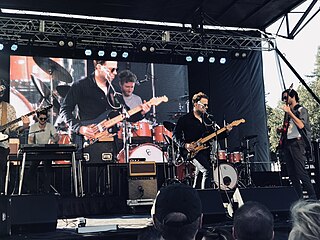
Crime of the Century is the third studio album by the English rock band Supertramp, released in September 1974 on A&M Records. Crime of the Century was Supertramp's commercial breakthrough in both the US and UK, aided by the UK hit "Dreamer" and the US hit "Bloody Well Right". It was a UK Top 10 album and a US Top 40 album, eventually being certified Gold in the US in 1977 after the release of Even in the Quietest Moments.... The album was Supertramp's first to feature drummer Bob Siebenberg, woodwinds player John Anthony Helliwell, bassist Dougie Thomson, and co-producer Ken Scott. The album has received critical acclaim, including its inclusion in Rolling Stone's "50 Greatest Prog Rock Albums of All Time".

Nelson is an American rock band founded by singer/songwriters Matthew and Gunnar Nelson. The band achieved success during the early 1990s with their double platinum debut album After the Rain, which featured the number-one hit "(Can't Live Without Your) Love and Affection".

"Garden Party" is a 1972 hit song written by Rick Nelson and recorded by him and the Stone Canyon Band on the album Garden Party. The song tells the story of Nelson being booed at a concert at Madison Square Garden.

"Honky Tonk Women" is a 1969 hit song by the Rolling Stones. It was a single-only release, available from 4 July 1969 in the United Kingdom, and a week later in the United States. It topped the charts in both nations.
Randall Herman Meisner is a retired American musician, singer, songwriter and founding member of the Eagles. Throughout his professional musical career, Meisner's main role was that of bassist and backing high-harmony vocalist as both a group member and session musician. He co-wrote the Eagles hit song "Take It to the Limit", which he also sang.

"Like a Stone" is a song by the American rock supergroup Audioslave, released as the second single from their eponymous debut studio album Audioslave in January 2003. The song topped both the Billboard Hot Mainstream Rock Tracks and Hot Modern Rock Tracks charts, and reached number 31 on the Hot 100 chart, making it their biggest US hit. "Like a Stone" has been certified Gold by the Recording Industry Association of America (RIAA). It became the fifth best performing alternative song on the Alternative Songs chart of the decade and the eighth best performing rock song on the Mainstream Rock chart of the decade.

"Take It to the Limit" is a song by the Eagles from their fourth album One of These Nights from which it was issued as the third single on November 15, 1975. It reached No. 4 on the U.S. Billboard Hot 100 and was also the Eagles' greatest success to that point in the UK, going to No. 12 on the charts. Billboard ranked it as the No. 25 song for 1976.
"On the Road Again" is a song written and made famous by country music singer Willie Nelson.

"If You Gotta Go, Go Now" is a song written by Bob Dylan in 1964. The first released version was as a single in the US by the UK group The Liverpool Five in July 1965, but this went uncharted in the US despite receiving much airplay, particularly in the Pacific Northwest. Another English band, Manfred Mann, then issued the song as a single in September 1965; this version reached number 2 on the UK charts.

Stephen A. Love is an eight times RIAA award winning Gold, Platinum and Multi platinum American professional entertainer, musician, CMG WORLDWIDE client, multi-instrumentalist, lead singer, songwriter, producer, entertainment business promoter, CEO of the James Allen Promotions and Blue Jeans Music BMI. He lives near New York City and in Puerto Vallarta, Jalisco, Mexico.
The discography of The Specials, an English ska revival band consists of eight studio albums, one collaboration album, five live albums, eleven compilation albums, four extended plays, twenty-three singles, and five videos.

Dawes is an American folk rock band from Los Angeles, California. Dawes is composed of brothers Taylor and Griffin Goldsmith (drums), along with Wylie Gelber (bass) and Lee Pardini (keyboards).
"A Wonder Like You" is a song written by Jerry Fuller and performed by Rick Nelson. The song reached #11 on the Billboard Hot 100 in 1961.
"Everlovin'" is a song written by Dave Burgess and performed by Rick Nelson. The song reached #16 on the Billboard Hot 100 and #23 in the UK in 1961.
"Teen Age Idol" is a song written by Jack Lewis and performed by Rick Nelson. The song reached #2 on the adult contemporary chart, #5 on the Billboard Hot 100, and #39 in the UK in 1962. The single's B-side, "I've Got My Eyes on You ", reached #105 on the Billboard chart.
"It's Up to You" is a song written by Jerry Fuller and performed by Rick Nelson. The song reached #4 on the adult contemporary chart, #6 on the Billboard Hot 100, #22 in the UK, and #24 on the R&B chart in 1963. The single's B-side, "I Need You", reached #83 on the Billboard Hot 100. The song is featured on his 1962 album, It's Up to You. The session musicians on this recording included John Audino and Tony Terran on trumpet, Allen Harris on Piano, James Burton and Glen Campbell on guitar, Joe Osborne on bass, and Ritchie Frost on drums, and Glen Campbell, Jerry Fuller and David Burgess on backup vocals.
"There's Nothing I Can Say" is a song written by Christian Sarrel and Al Stillman and performed by Rick Nelson. The song reached #18 on the adult contemporary chart and #47 on the Billboard Hot 100 in 1964. The single's B-side, "Lonely Corner", reached #113 on the Billboard chart.

"Something from Nothing" is a song by the American rock band Foo Fighters from their eighth studio album Sonic Highways. It was released as the album's lead single on October 16, 2014. Recorded at Steve Albini's Electrical Audio studio, the song was influenced by the Chicago music scene.











